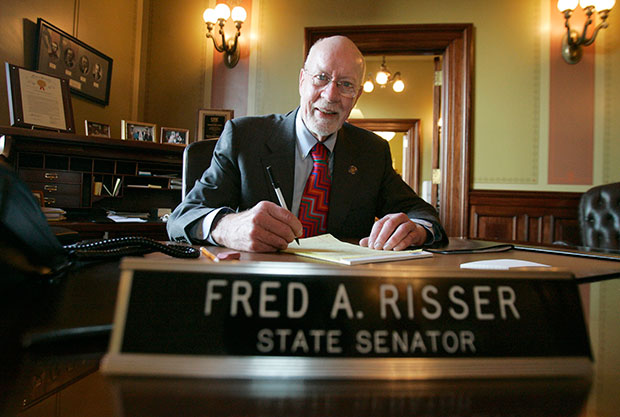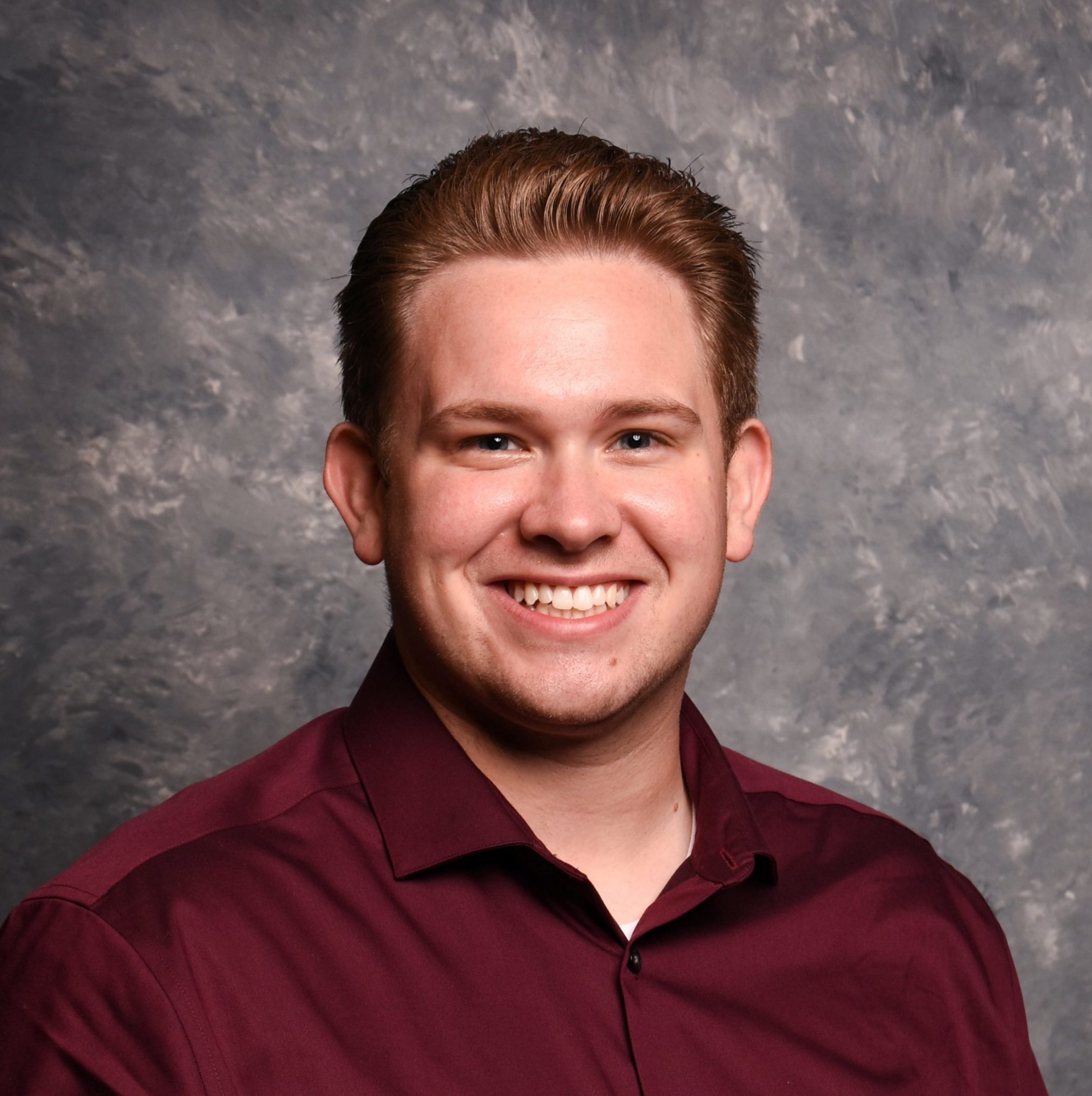Risser, longest-serving lawmaker in US history, reflects on career, opportunities ahead
By: Michaela Paukner, [email protected]//February 1, 2021//
Risser, longest-serving lawmaker in US history, reflects on career, opportunities ahead
By: Michaela Paukner, [email protected]//February 1, 2021//

On Jan. 4, the Wisconsin Legislature convened for the first time in 65 years without state Sen. Fred Risser.
The 93-year-old Madison Democrat, who has never missed a roll call, retired at the beginning of January.
“I feel sort of empty in a way because things are going on in the Capitol that I am not participating in,” Risser said. “But I live right across the street. So I can look at the Capitol and think about it from the outside.”
His retirement marked the end of an age in U.S. history. Risser is the longest-serving legislator the country has ever had. He was also the last remaining World War II veteran in state legislatures or Congress.
Following his service as a Navy medic, Risser earned a bachelor’s degree and then his law degree from the University of Oregon in 1952. He was elected to the Wisconsin Assembly in 1956 and moved to the state Senate in 1962. He served as Senate president 15 times over 25 years and worked with 13 Wisconsin governors.
Risser takes pride in his decades of public service and continuation of a family tradition of advocating for the people of Wisconsin. He’s of the fourth generation of his family to represent Madison in the Legislature. The Wisconsin Department of Justice’s headquarters is even named the Risser Justice Center in his forebear’s honor.
Among Fred Risser’s proudest accomplishments during his 64 years in the Legislature are his authorship of the Clean Indoor Air Act and the Capitol Master Plan, his service on the State Building Commission for 50 years and on the Joint Committee on Finance, and his advocacy for environmental justice and women’s issues.
Many of those successes didn’t come easily. Risser spent 20 years fighting for restrictions on smoking and 10 years on pushing for renovations to the tate Capitol renovation. It was his commitment to the people he represented that kept him going.
“I’m honored that my constituency allowed me here to be representative of them as long as they did,” Risser said. “And I think I’ve done my best to handle my job.”
The Wisconsin Law Journal talked to Risser two days after he retired about his career in the Legislature, his advice to lawmakers and his plans for the years ahead.
Wisconsin Law Journal: What were some of the biggest difficulties you encountered as a lawmaker, and what drove you to overcome them?
Risser: Well, you don’t always win. As a legislator, you’re not going to be successful at everything. I’ve introduced a number of measures that I think were in the interest of the public (that were unsuccessful). I feel that the focus of a legislator is to help those that need help, to maintain civil society. Unlike some legislators who have special interests in mind, my special interest is the public and my constituency. I’m honored to have represented them as long as I have and that they gave me the opportunity to continue on as long as I did.
WLJ: How has the Legislature changed over your more than 60 years of service?
Risser: First of all, when I started out, it was part-time. We only got paid for the months we were in session, and we were only in session about six months out of a two-year period. Now it’s a full-time Legislature. We get paid whether we’re in the Legislature or not. Going from part-time to full-time resulted in me going from no staff to having a full-time staff, and from having no facilities to having offices in the buildings.
Another change that I think is a good change is there’s much more diversity in the Legislature. When I started out in the state Senate in 1962, it was all white men. In fact, over the first 110 years or so of the state, there had never been anything but white men in the state Senate. Now, we have a much greater diversity.
In addition, it’s become much more partisan. When I started out, you had conservatives and liberals in both parties, and instead of lining up Democrats vs. Republicans, you’d line up a coalition of conservatives vs. a coalition of progressives or liberals, and so you have bipartisanship to a great degree.
Of course, money’s another thing. I originally could get elected on a couple hundred dollars. Now elections cost tens of thousands. In fact, we’ve had some state Senate races in which over $1 million dollars has been spent, even though it only pays $50,000 a year. The Legislature being full time means you either have to have money or have to go get money in order to run. Legislators are spending much more time raising money, and that is necessary unless you’re independently wealthy or have an angel to take care of everything.
WLJ: What do you think needs to happen to return to that bipartisanship that you saw early on in your career?
Risser: Well, it’s going to be kind of hard right now because I think the partisanship on the national level is trickling down to the state level. In other words, I blame the federal government first for being overly partisan and having that trickle down to the state level. You’re going to have to get a mixture of conservatives and liberals in both parties. It tends to take various philosophies within a party to develop more of a nonpartisan approach. As long as you put all your people of the same philosophical belief in a single party, you’re going to have a partisan shift that you can’t break very well.
Of course in Wisconsin, we have another problem. We have a gerrymandered Legislature. Even though the Democrats are able to get more votes for Legislative positions, a number of actual elections have gone the other way. That’s something that’s come up this time in the session. I’m sorry I’m not there to help work on it, but reapportioning the Legislature is going to be very significant this session. Hopefully it will reapportion it so that we have a more even approach.
WLJ: What advice do you have for the new class of lawmakers?
Risser: Maintaining a relationship with your constituency is important because this is a representative democracy, and we function by selecting representatives. Our country and our democracy is no better than people we select to run it. You can have all the constitutions and all the laws in the world, but those who are asked to participate are ones that either make or break it.
Being a representative is a skill of communicating with people and listening to people and doing your best. You can’t represent your people unless you meet with them and communicate with them. Some legislators don’t do that, and they don’t last too long. It’s just like going to church. You get what you put into it.
Also, first impressions are very important in the Legislature. First impressions have an effect on the Legislative process and have a greater effect on your colleagues. I think keeping your word is very significant. If you’re going to commit yourself to something, keep your word on it, and if you have to change, make an explanation for it.
WLJ: What’s next for you in retirement?
Risser: Well, I’m 93 years of age and in good health, and I have a good wife who retired many years ago. Quite frankly, the first thing I’m going to do is try to organize things a little bit. I’m looking forward to being active. I’m looking forward to new horizons. And while I miss the Legislature and the activity there, I’m sure that I’ll find enough to keep me busy. I think anyone who is interested and capable should participate in government one way or another and in keeping our democracy viable. I will continue to be politically active. I’m interested in the environment, and I intend to get involved in an environmental movement and devote my energies to helping it out. To me, it’s paramount. We have only one world, and it’s shrinking every day. We have to protect what we have for the future, or we’ll lose it all. I’m looking forward to finding a niche in that respect.
Legal News
- Former law enforcement praise state’s response brief in Steven Avery case
- Eric Toney announces re-election bid for Fond du Lac County District Attorney
- Former Wisconsin Democratic Rep. Peter Barca announces new bid for Congress
- Republicans file lawsuit challenging Evers’s partial vetoes to literacy bill
- More human remains believed those of missing woman wash up on Milwaukee Co. beach
- Vice President Harris returning to Wisconsin for third visit this year
- Wisconsin joins Feds, dozens of states to hold airlines accountable for bad behavior
- Trump ahead of Biden in new Marquette poll
- Bankruptcy court approves Milwaukee Marriott Downtown ‘business as usual’ motion
- New Crime Gun Intelligence Center to launch in Chicago
- Arrest warrant proposed for Minocqua Brewing owner who filed Lawsuit against Town of Minocqua
- Wisconsin Supreme Court justices question how much power Legislature should have
WLJ People
- Power 30 Personal Injury Attorneys – Russell Nicolet
- Power 30 Personal Injury Attorneys – Benjamin Nicolet
- Power 30 Personal Injury Attorneys – Dustin T. Woehl
- Power 30 Personal Injury Attorneys – Katherine Metzger
- Power 30 Personal Injury Attorneys – Joseph Ryan
- Power 30 Personal Injury Attorneys – James M. Ryan
- Power 30 Personal Injury Attorneys – Dana Wachs
- Power 30 Personal Injury Attorneys – Mark L. Thomsen
- Power 30 Personal Injury Attorneys – Matthew Lein
- Power 30 Personal Injury Attorneys – Jeffrey A. Pitman
- Power 30 Personal Injury Attorneys – William Pemberton
- Power 30 Personal Injury Attorneys – Howard S. Sicula











